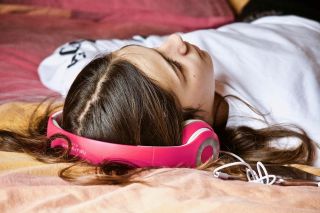Sleep
Late Bedtime and Irregular Sleep Are Related to Poor Grades
Adolescents should go to bed and get up at about the same time every day.
Posted March 15, 2024 Reviewed by Tyler Woods
Key points
- Insufficient sleep in adolescence leads to poor academic performance.
- Most studies of sleep insufficiency have focused on sleep duration.
- New research shows that high variability in sleep routines are harmful.
- Adolescents should try to go to bed and wake up at about the same time every day.
In two previous posts, I have written about the importance of night-to-night regularity of sleep timing for children and adolescents. I described studies that linked irregular sleep to metabolic problems in children who were overweight or obese. Another post described imaging studies that showed compromised brain functioning with more variable sleep schedules.

The links between poor sleep and academic performance have been known for a long time. Most research on how sleep relates to academic performance in children and adolescents has emphasized the need for sufficient sleep duration. A new study confirms that the regularity of sleep timing and duration are related to academic performance.
In a large national sample of teens, Gina Mathews and colleagues analyzed multiple sleep dimensions through one week of actigraphy (measurements taken using tools such as a FitBit) as they related to school grades and the frequency of being suspended or expelled. The researchers studied sleep factors including duration, bedtimes and wake times, sleep quality, and variability.
Variability is defined as going to bed at different times and sleeping for different durations. For example, low variability might mean one teenager going to bed at 11:00 PM every night (including weekends) and waking up at 6:00 AM every morning, getting seven hours of sleep. High variability might mean another teenager going to bed at 11:00 PM one night, 12:30 PM the next night, 9:30 PM the third night, and so on. Duration of sleep might be seven hours, five and a half hours, and eight and a half hours—an average of seven hours. In both cases, they are sleeping about the same duration but with different degrees of regularity.
The same authors reported in a previous study that teenagers whose sleep was more variable had lower levels of positive mood than those whose bedtimes and durations were more regular. In both studies, sleep duration itself did not relate to either academics or mood.
Academic performance and emotion regulation are almost always seen as separate domains of functioning. But consider that if poor sleep causes one to be in a bad mood, the bad mood may relate not only to emotional and behavioral problems but also contribute to poor school performance.
These are not the first studies to show the importance of sleep regularity. In studies from our own lab, we have found similar results (e.g., El-Sheikh et al., 2010). So why would regularity have these effects? The central clock in the midbrain regulates the circadian cycle of sleep and wake. During sleep, many bodily functions change. Heart rate and blood pressure drop, breathing slows, changes take place in metabolism, and memories are consolidated. For a long time, we believed that the central clock was the sole controller of the timing of these functions.
More recently, timing mechanisms have been discovered in many physiological systems. For example, they have been found in the digestive system, where they regulate glucose homeostasis and the metabolism of fats and bile. When sleep is irregular, these functions are disrupted, and these disruptions may manifest in changes in mood, attention, and behavior.
The conclusion is that while most recommendations about sleep have to do with how long you sleep, of equal or even greater importance is to have sleep and wake schedules around the same times every day.
References
El‐Sheikh, M., Kelly, R. J., Buckhalt, J. A., & Benjamin Hinnant, J. (2010). Children’s sleep and adjustment over time: The role of socioeconomic context. Child Development, 81 (3), 870-883.
Mathew, G. M., Reichenberger, D. A., Master, L., Buxton, O. M., Chang, A. M., & Hale, L. (2024). Actigraphic sleep dimensions and associations with academic functioning among adolescents. Sleep, zsae062.
Mathew, G. M., Reichenberger, D. A., Master, L., Buxton, O. M., Chang, A. M., & Hale, L. (2023). Actigraphic sleep variability is associated with lower positive mood in adolescents. Journal of Adolescent Health, 73 (3), 478-485.
Segers, A., & Depoortere, I. (2021). Circadian clocks in the digestive system. Nature Reviews Gastroenterology & Hepatology, 18 (4), 239-251.


